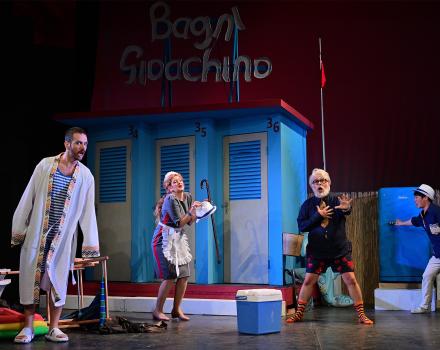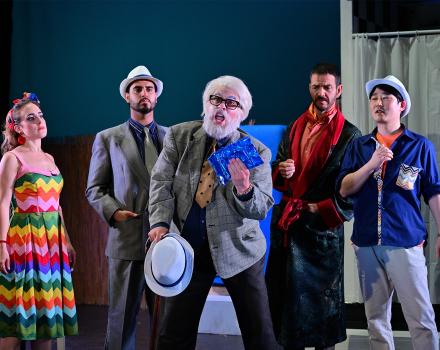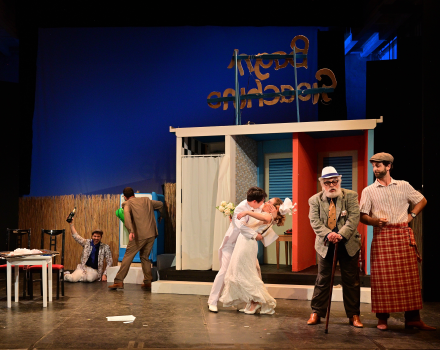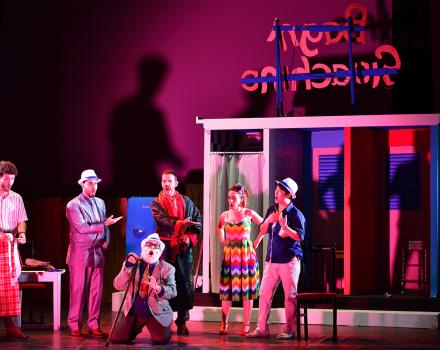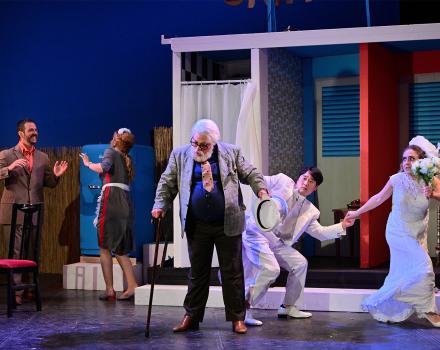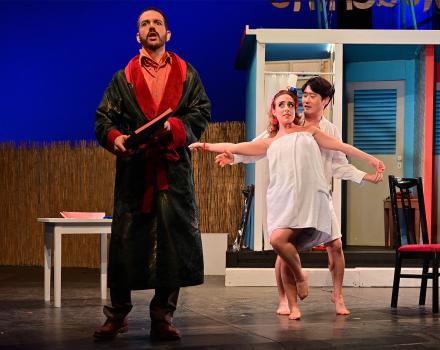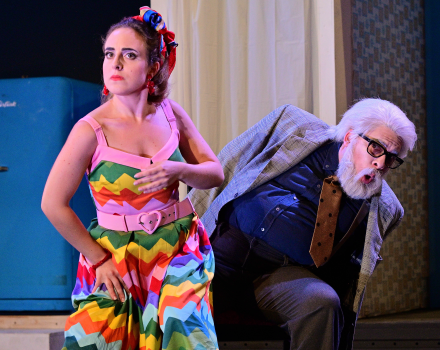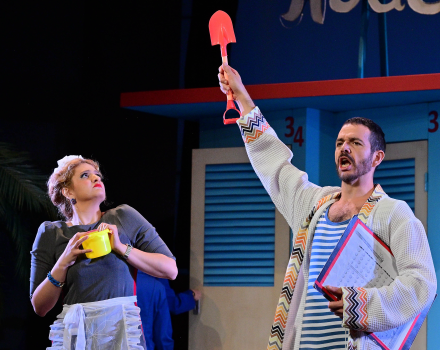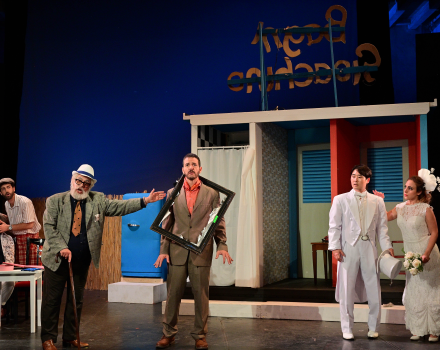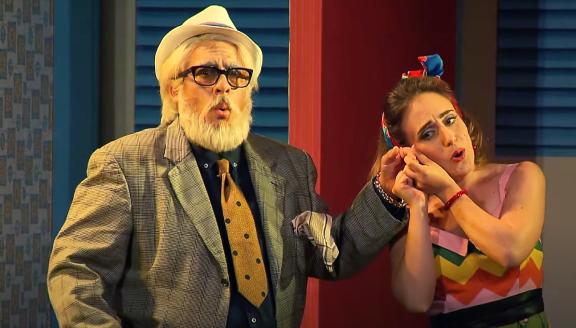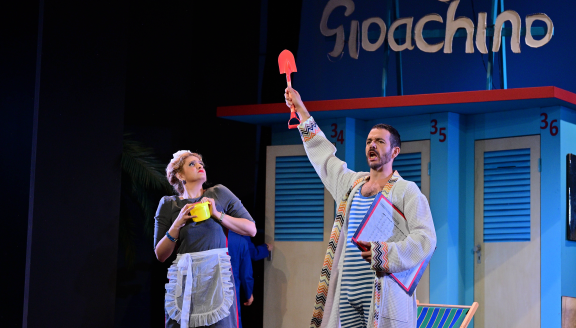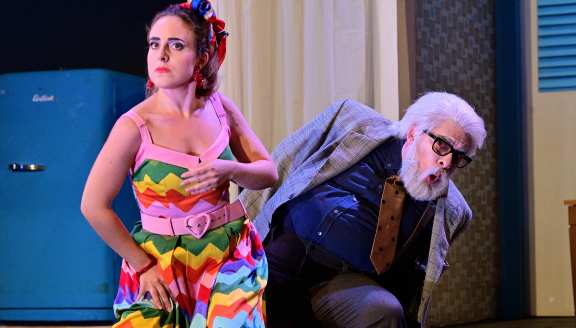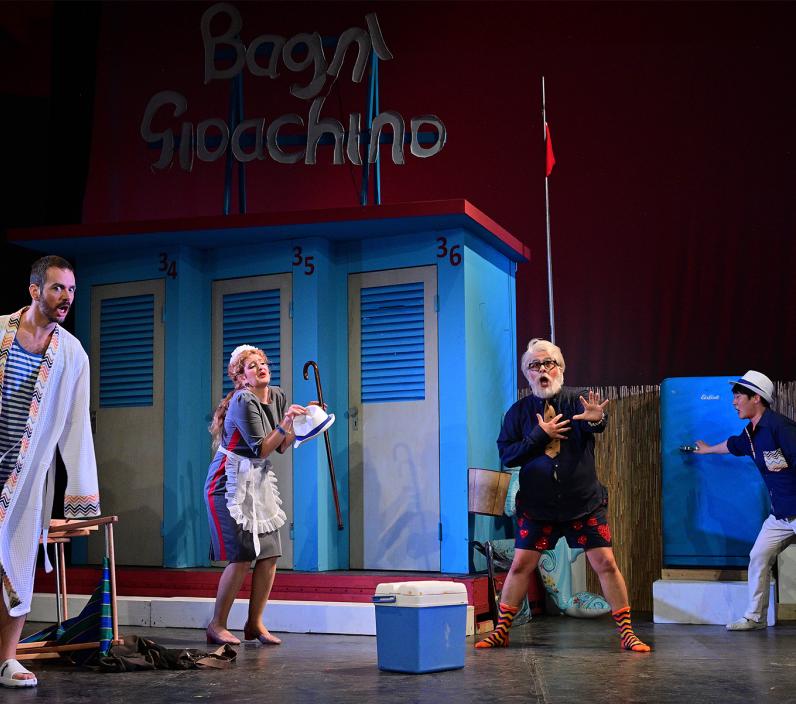
The rich Gaudenzio has promised his ward Sofia to the son of his friend Bruschino without asking. But the latter is held in an inn with a drinking debt. Florville, Sofia's lover, unceremoniously poses as Bruschino junior. The identity theft leads to an absurd situation, because the whole world assumes that old Bruschino is denying his paternity - that is until, in the greatest confusion, the prodigal son turns up.
Although relatively early in Rossini’s output (1813), Il signor Bruschino shows the composer already at the height of his outrageous opera-buffa style. It is a masterpiece of comic verve and invention. Rossini’s idiosyncratic music is there from the start; in the overture, the second violins tap their bows on the metal candle holders attached to their music stands in a rhythmic gesture that pervades the whole piece. The venue for this production is just as enchanting. In the wildly romantic Kurpark in the middle of Germany’s Black Forest, stands the Kurtheater from 1864, looking not unlike a Swiss chalet with neo-baroque elements. Since its re-opening 2005 with Joan Sutherland as patron, the Kurtheater with his only 200 seats has been the heart of a remarkable summer festival Rossini in Wildbad, presided over by Jochen Schönleber, who also directs this production with an excellent cast of Rossinian voices.
Cast
|
Gaudenzio, the tutor
|
Giorgio Caoduro
|
|---|---|
|
Sofia, his ward
|
Eleonora Bellocci
|
|
Bruschino senior
|
Emmanuel Franco
|
|
Bruschino junior
|
Francesco Lucii
|
|
Florville, Sofia's lover
|
Hyunduk Kim
|
|
A Police Commissioner
|
Filiberto Francesco Bruno
|
|
Filiberto, an innkeeper
|
Francesco Bossi
|
|
Marianna, a maidservant
|
Camilla Carol Farias
|
|
Orchestra
|
Kraków Philharmonic Orchestra
|
| ... | |
|
Music
|
Gioachino Rossini
|
|---|---|
|
Text
|
Giuseppe Maria Foppa
|
|
Conductor
|
José Miguel Pérez-Sierra
|
|
Director
|
Jochen Schönleber
|
|
Sets
|
Jochen Schönleber
adapted from an idea by Anton Lukas
|
|
Costumes
|
Olesja Maurer
|
|
Pianoforte
|
Gianluca Ascheri
|
| ... | |
VIDEOS
STORY
Florville returns after a long absence to see his beloved Sofia again outside the house of her guardian Gaudenzio. The maid Marianna is waiting for him and makes disturbing insinuations. Sofia also appears, and for a short time the two are united. Sofia informs Florville that the guardian has already promised her to the son of a certain Bruschino. Undeterred, they both decide to disregard this plan.
The innkeeper Filiberto appears. Florville introduces himself to him as Bruschino's agent and thus learns that Filiberto has imprisoned the young Bruschino because he still owes him money after alcoholic excesses. Florville is able to wrestle a letter from the innkeeper, in which the prisoner asks his father for money and which Gaudenzio is supposed to transport, by pretending to be the prisoner's cousin and paying part of the demanded sum - on the condition, however, that Filiberto does not release him until the rest of the debt has been paid. Alone again, Florville formulates his plan to pretend to be Bruschino junior and to let Marianna in on it.
Gaudenzio is busy thinking melancholy thoughts about the course of the world when Marianna hands him a letter from his old friend Bruschino, faked by Florville, in which he apologises for his son's bad behaviour and asks him to arrest the no-good as soon as he appears. Servants promptly usher in Florville alias Bruschino junior. With fatherly kindness, Gaudenzio forgives his future son-in-law for all his pranks. Then Bruschino senior appears, furious about his offspring's financial escapades; he is also suffering from the gout and the heat. When Florville introduces himself as Bruschino junior, he believes himself surrounded by madmen and finally calls out, confused and desperate, for the police commissioner. The heat overwhelms him.
Gaudenzio sends for Sofia, who is to dissuade Bruschino from his supposed plan to disown his son. Touching pleas from the refined lovers have as little effect on the old man as threats. The commissioner, who finally arrives, brings a letter from the real Bruschino junior, in which he asks the recipient to intercede for him with his father. The comparison of the handwriting of this letter with that of the letter to Gaudenzio clearly proves to the commissioner that Florville is Bruschino's son. Old Bruschino becomes completely upset and remains alone. Only Filiberto, who has come to collect the rest of his debts, reveals to him the true connections. Bruschino senior plots revenge: in order to prevent Gaudenzio from revealing Florville to be the son of his arch-enemy in time, he plays along with the comedy, finally recognises the young man as his son, to his amazement, and demands that the marriage be performed immediately. Filiberto's return with the finally freed real Bruschino junior would now ruin his intrigue if the wedding certificate had not already been signed. Out of necessity, Gaudenzio forgives and puts on a brave face. Bruschino's straightforwardness wins the day.
INSIGHTS
Notes on the directorial concept by Jochen Schönleber
Signor Bruschino first staged in 2009 with the great comedians Stefania Bonfadelli and Bruno Praticò was great fun, which is why we envisaged a new edition.
For us, the action takes place in the sixties in a somewhat run-down lido on the Enz (or perhaps on the Adriatic?). In those days, people still wrote letters and not text messages, which influenced the search for a time frame. Gaudenzio has money worries, which he hopes to solve through the rich Mr Bruschino. He wants to expand the summer ‘living room’ of all the Pesarese (I mean Wildbaders), i.e. the lido, and put even more beach chairs in it. This requires the marriage of his ward Sofia to Bruschino's son, whom he has never seen. Gaudenzio is not the evil guardian, he probably wants the best for his Sofia, but he is (in 18th century logic) culpably negligent because he gives scarce attention to the bridegroom and is too fixated on his own goals to act sensibly. The doors of the lido swing open and slam shut; this a very effective pacing device in comedies.
The refrigerator, a central prop, arose from the repeated ‘Uh che caldo’ (Phew, what heat!). That's why Mr Bruschino cools off in it. But everyone else also has their own reference to it.
In language, as in theatre, the rule is that objects get their meaning through use: once says ‘nothing’, twice says ‘something’ and three times says ‘a lot’. And so there are a lot of props with double or multiple meanings. Beach flags signal not only safe bathing but also explosive moods, an inflatable crocodile can also be different, and so on. And then there is the ambiguity of the actions and roles. After all, it is completely clear in the duet that Sofia knows more about love than the dorky Gaudenzio. Particularly effective is the shower scene, where all the paradoxes of the libretto come to a head.
The central conclusion for my interpretation is that nothing is as it seems, but that there is a form of affection that endures beyond all contestation: this is the great humanity of that old Bruschino. He is offered a false but clever son and in the end he accepts his own but failed one, who makes him angry. Is that guy really able to repent? I think there is just a residual sense of guilt on the part of the wayward groom, for the rest he's just completely drunk in his Marche funèbre. But the nice thing is that Bruschino takes his revenge in a measured and rather pedagogical way: he lets the over-zealous Gaudenzio run riot and also pulls the lovers' ears, but at the end he helps them to explain their distress and forces Gaudenzio to agree. A rough exterior reveals its humane heart.
I am looking forward to showing this fast-paced comedy for our small but perfectly formed stage to a large audience on OperaVision.
Gallery
